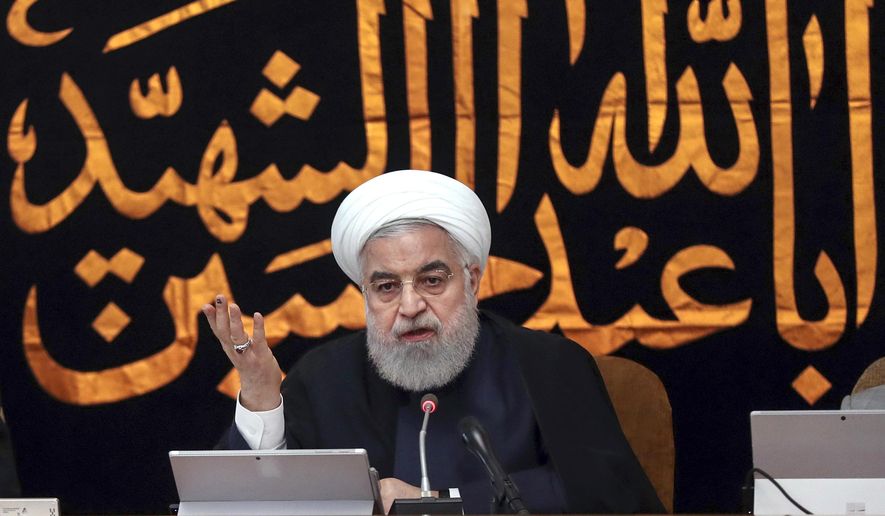WASHINGTON (AP) - The Trump administration stepped up pressure on Iran on Wednesday, imposing sanctions on an oil shipping network with ties to Iran’s Revolutionary Guard and offering a reward of up to $15 million for anyone with information that could disrupt its faltering economy even further.
The new measures are the latest installment in a campaign of “maximum pressure” aimed at forcing Iran to renegotiate the 2015 nuclear deal, from which the administration withdrew last year, and cease a range of activities that the U.S. and its allies say destabilize the Middle East.
In announcing these new steps, U.S. officials appeared to dampen expectations for European-led efforts to salvage the remainder of the nuclear deal.
“There will be more sanctions coming,” Brian Hook, the U.S. special envoy for Iran, told reporters at the State Department. “We can’t make it any more clear that we are committed to this campaign of maximum pressure.”
President Donald Trump, meanwhile, repeated that he was still open to negotiations with Iranian President Hassan Rouhani. “They want to talk,” he said at the White House. “They want to make a deal.”
The sanctions announced by the State and Treasury departments target 16 firms, 10 people and 11 vessels involved in what U.S. officials say is a network controlled by the Guard that ships millions of dollars’ worth of oil, mostly to Syria, in violation of American sanctions. Companies or individuals doing business with the shipping network also could be exposed to punishing U.S. financial measures.
The U.S. singled out the India-based Mehdi Group for providing crews and vessels used by the network, as well as several affiliates and other firms based in Lebanon, Singapore and the United Arab Emirates.
Administration officials say proceeds from the sales are used to fund Iran’s nuclear and missile programs and also to support groups such as Lebanon’s militant Hezbollah movement.
Treasury Secretary Steven Mnuchin said in a statement the sanctions on the shipping network are intended to make it “explicitly clear that those purchasing Iranian oil are directly supporting Iran’s militant and terrorist arm,” the Revolutionary Guard.
In a separate announcement, Hook said Washington would offer rewards of up to $15 million to anyone who provides information that leads to the disruption the Guard’s finances. The offer is the first under the Rewards for Justice Program to seek information about the actions of a foreign government entity. Earlier this year the administration designated the Guard a “foreign terrorist organization,” the first time it has done so with a governmental agency.
The reward “gives members of the maritime community a new tool to help us combat Iran’s oil-for terror network,” Hook said. “We urge any person with information that leads to the disruption of Iran’s petroleum shipping network to contact us.”
A U.S. official said the administration sought last week to convince the captain of an Iranian oil tanker recently detained and released by the British territory of Gibraltar to accept a cash payment in return for halting the vessel’s course. The captain did not respond to the offer and on Friday the administration added him to the sanctions blacklist, according to the official, who was not authorized to discuss the matter publicly and spoke on condition of anonymity.
The Financial Times, which first reported the offer, said Hook made the offer. The envoy did not comment on the report but noted that anyone involved in transporting Iranian oil in violation of the sanctions could face consequences. “The criminal liability and immigration consequences of crewing Iranian tankers are real and not worth the risk,” he said.
Iran’s Foreign Minister Mohammad Javad Zarif denounced the offer to the ship’s captain as “outright blackmail.”
“Having failed at piracy, the US resorts to outright blackmail - deliver us Iran’s oil and receive several million dollars or be sanctioned yourself,” he said on Twitter.
Hook said the U.S. is seeking information about the Guard’s revenue sources, including from oil sales, the operations of front companies and criminal enterprises. The force operates independently of the regular Iranian military and has vast economic interests.
The latest sanctions were announced a day after France’s finance minister visited Washington to meet with Mnuchin in part over French President Emmanuel Macron’s proposal to create a $15 billion line of credit for Iran to entice it to remain in the nuclear deal. The proposal, which has not been formalized, would require the U.S. to waive or exempt some transactions from the sanctions it has re-imposed on Iran since Trump withdrew from the international deal last year.




Please read our comment policy before commenting.